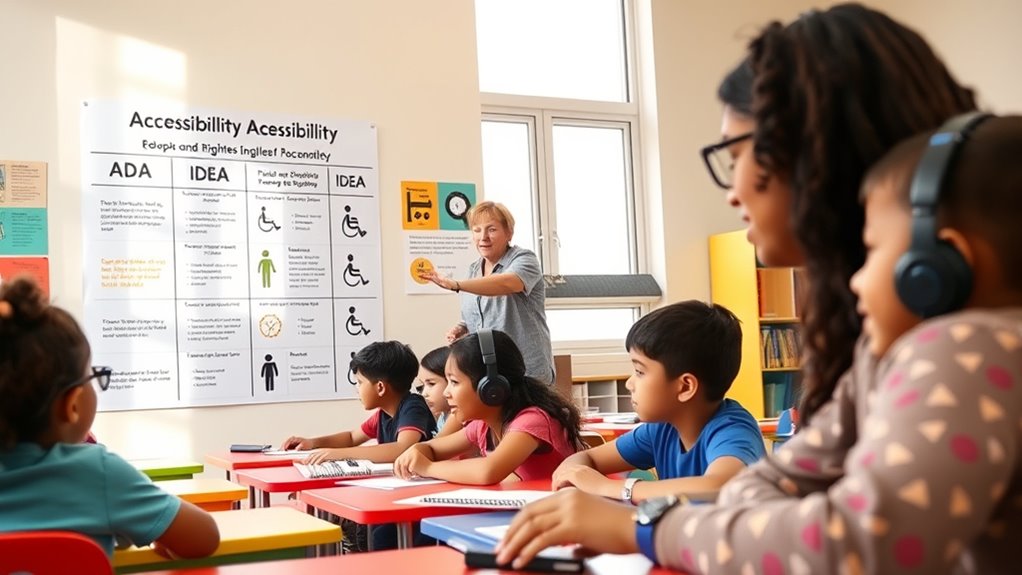You have the right to fair treatment and equal access under the ADA and IDEA. This means employers can’t discriminate against you and must provide reasonable accommodations at work. In schools, IDEA guarantees support, like assistive technology and modifications, to help you succeed. If issues arise, you can file complaints or seek legal help to enforce your rights. Keep exploring to discover how to protect yourself and get the support you deserve.
Key Takeaways
- You have the right to protection from discrimination based on disability in employment and public spaces.
- Employers and schools must provide reasonable accommodations to support your needs.
- Disclosure of your disability is voluntary and confidential, used to access necessary support.
- You can file complaints and seek legal remedies if your rights under ADA or IDEA are violated.
- Students with disabilities are entitled to free, appropriate public education through IEPs and related services.

JIAN BOLAND USB Fingerprint Reader Fingerprint for Windows10/11, Windows Hello Automatic Driver Installation with 5ft Extension Cable-Windows Password Free Operation
🔑Instant Windows Hello Integration:Seamlessly access your Windows 10/11 PC with Microsoft-certified biometric authentication. Replace cumbersome passwords with one-touch…
As an affiliate, we earn on qualifying purchases.
As an affiliate, we earn on qualifying purchases.
Understanding Your Rights to Equal Employment Opportunities

Understanding your rights to equal employment opportunities is essential because both the ADA and IDEA aim to safeguard you from discrimination and guarantee fair treatment in the workplace. If you have a disability, you have the right to disclose it voluntarily—this is called disability disclosure. You’re not required to reveal your disability unless you need accommodations or believe it affects your job performance. Employers are prohibited from employment discrimination based on your disability or perceived disability. Knowing when and how to disclose can help prevent unfair treatment and ensure you’re protected under the law. Additionally, projector technology such as high contrast ratios and accurate color reproduction can enhance visual experiences, which underscores the importance of understanding your rights to create a supportive environment. Remember, you’re entitled to a workplace free from bias, and understanding these rights empowers you to advocate for yourself confidently and assertively.
![Legal Rights You Should Know Under the ADA and IDEA 5 Dragon Professional 16.0 Speech Dictation and Voice Recognition Software [PC Download]](https://m.media-amazon.com/images/I/41mYWIw3-dL._SL500_.jpg)
Dragon Professional 16.0 Speech Dictation and Voice Recognition Software [PC Download]
Dictate documents 3 times faster than typing with 99% recognition accurancy, right from the first use
As an affiliate, we earn on qualifying purchases.
As an affiliate, we earn on qualifying purchases.
The Right to Reasonable Accommodations in the Workplace

You have the right to ask for reasonable accommodations that help you perform your job effectively. These adjustments safeguard your rights and guarantee a fair work environment. Examples include modified work schedules, assistive technology, or accessible workspace changes. Implementing effective testing practices, such as automated testing, can also ensure the reliability of workplace software systems.
Definition of Reasonable Accommodations
A reasonable accommodation is a modification or adjustment to the work environment or job responsibilities that enables you, as an employee with a disability, to perform essential job functions. This can include providing assistive technology, like screen readers or voice recognition software, to help you work effectively. It also involves ensuring that the workplace meets accessibility standards, such as ramps or accessible restrooms. The goal is to remove barriers that hinder your ability to do your job. Reasonable accommodations are tailored to your needs and should not impose an undue hardship on your employer. By implementing these adjustments, your employer helps create an inclusive environment where everyone has equal opportunity to succeed. Staying informed about legislative changes and policies can help you better understand your rights and options under the ADA and IDEA.
Employee Rights and Protections
Employees with disabilities have the legal right to request reasonable accommodations that enable them to perform their essential job functions. You can disclose your disability when you feel comfortable, which helps your employer understand your needs. Workplace advocacy is encouraged, and your employer must keep your disclosure confidential. As an employee, you are protected from discrimination and retaliation if you request accommodations or disclose your disability. Remember, you don’t have to prove your disability; simply inform your employer. Here’s what you should know:
- You can request specific accommodations without fear of penalty
- Your employer must engage in an interactive process to find suitable solutions
- You are protected against retaliation for exercising your rights under ADA
- Understanding workplace rights can help you navigate the process more effectively
Knowing your rights helps you advocate effectively and secure the support you need at work.
Examples of Workplace Adjustments
Workplace adjustments are practical solutions that help employees with disabilities perform their jobs effectively. These accommodations improve workplace accessibility and support disability inclusion. For example, you might need an ergonomic chair or height-adjustable desk to reduce physical strain. Providing screen readers or speech-to-text software can assist employees with visual or hearing impairments. Adjusting work schedules or offering telework options helps those who require flexible hours. Modifying training materials into accessible formats ensures everyone can participate fully. These adjustments demonstrate your employer’s commitment to fostering an inclusive environment. Reasonable accommodations are essential for leveling the playing field, allowing you to contribute your skills fully. Incorporating assistive technology can further enhance accessibility in the workplace. By implementing such measures, workplaces become more accessible, welcoming, and supportive for everyone.

Tools, Equipment and Machinery Adapted for the Vocational Education and Employment of Handicapped People
As an affiliate, we earn on qualifying purchases.
As an affiliate, we earn on qualifying purchases.
Your Protections Against Discrimination and Harassment

Your rights under the ADA and IDEA protect you from discrimination and harassment based on your disability. These laws ensure you’re treated fairly and with respect, fostering disability awareness and promoting accessibility improvements. If you experience discrimination or harassment, you can take action, such as reporting issues to your school or employer. The laws also require workplaces and schools to prevent harassment and address any complaints promptly. Understanding self-watering plant pots can also serve as a metaphor for how accessible environments should support your needs consistently and reliably.
Remember, you’re protected against:
- Unfair treatment or exclusion due to your disability
- Harassment or hostile environments
- Neglecting to implement accessibility improvements that accommodate your needs
Knowing your rights helps you stand up for yourself and seek support when needed. These protections aim to create safe, inclusive environments where everyone can thrive.

Tapping into Hidden Human Capital: How Leading Global Companies Improve their Bottom Line by Employing Persons with Disabilities
As an affiliate, we earn on qualifying purchases.
As an affiliate, we earn on qualifying purchases.
Access to Public Places and Services

Have you ever wondered how accessible public places and services are for people with disabilities? The ADA guarantees you have the right to accessible facilities, like ramps, elevators, and signage. These accommodations make it easier to navigate stores, restaurants, and transportation. Service animals are also permitted in public spaces to assist with your needs. To understand this better, see the table below:
| Public Place | Accessibility Feature |
|---|---|
| Grocery Stores | Wide aisles, accessible checkout |
| Restaurants | Ramps, accessible seating |
| Public Transit | Low-floor buses, priority seating |
| Parks | Ramped paths, accessible restrooms |
| Offices and Banks | Automatic doors, accessible counters |
Your rights help ensure you can access community resources easily and without discrimination.
Additionally, accessible design plays a crucial role in creating inclusive environments that accommodate everyone’s needs.
Rights to Educational Support and Modifications Under IDEA

Under IDEA, you have the right to an Individualized Education Plan (IEP) tailored to your needs. You can also request specific accommodations and modifications to support your learning. If disputes arise, due process procedures are available to guarantee your rights are protected. Additionally, understanding the divorce process in your state can be helpful if family circumstances change.
Individualized Education Plans (IEPs)
Did you know that an Individualized Education Plan (IEP) is a essential tool designed to guarantee students with disabilities receive the appropriate support and accommodations? Your IEP outlines specific educational goals and the services you need to succeed. It’s developed through a collaborative process that includes assessments and input from educators, specialists, and you. The plan may include provisions for:
- Assistive technology to help with communication or learning tasks
- Adjusted assessment procedures to fairly evaluate your progress
- Customized instructional strategies tailored to your needs
Your IEP ensures you receive tailored support so you can access the general curriculum and thrive academically. It’s a legal document that protects your right to specialized services under IDEA. Additionally, understanding the essential role of assessment in developing an effective IEP can help you advocate for your educational needs.
Accommodations and Modifications
Because every student learns differently, the IDEA guarantees your right to accommodations and modifications that support your educational needs. These adjustments help you access the curriculum and demonstrate your knowledge effectively. You might use assistive technology, such as speech-to-text devices or specialized software, to enhance learning. If you rely on a service animal, the school must allow its presence in the classroom and other areas. Accommodations can include extended test time, seating arrangements, or modified assignments, while modifications might involve changing the curriculum or learning expectations. The goal is to provide a tailored educational environment that respects your individual needs and helps you succeed. Schools are required to implement these supports to ensure an equitable learning experience for you.
Due Process Procedures
How can you guarantee your educational rights are protected if disagreements arise over accommodations or modifications? The IDEA provides due process procedures to help you. These procedures ensure dispute resolution and compliance enforcement, giving you a clear path to resolve conflicts. If you believe your child’s rights aren’t being met, you can request mediation, file a complaint, or request an impartial hearing. These options help resolve disputes efficiently and fairly. The goal is to protect your child’s right to appropriate educational support and modifications. Remember, these procedures are in place to ensure your concerns are heard and that schools comply with IDEA requirements. Staying informed about emotional support options and resources can also strengthen your advocacy efforts. Stay informed and advocate for your child’s educational needs through these essential due process protections.
The Role of Free and Appropriate Public Education (FAPE)

Have you ever wondered what makes public education truly accessible for students with disabilities? It’s the guarantee of Free and Appropriate Public Education (FAPE), a core part of disability rights under the IDEA. FAPE ensures that students with disabilities receive special education services tailored to their individual needs at no cost to you. This means schools must provide an education that is both suitable and designed to help students succeed, including related services like speech or occupational therapy. Without FAPE, students could be left behind, missing out on the support they need to thrive academically. Your rights under the law protect your access to this essential service, making sure that every student with a disability receives an equal opportunity to learn and grow in a supportive environment.
How to Request and Obtain Accommodations in School and Work Settings

To get accommodations in school or work, start by requesting formal documentation from your healthcare provider or specialist. Communicate your needs clearly and early to make certain your request is understood and considered. Be sure to follow up and confirm that your accommodations are in place and working effectively.
Request Formal Documentation
Requesting formal documentation is a crucial step in securing accommodations under the ADA and IDEA. This documentation provides official proof of your needs and helps guarantee your rights are respected. When requesting it, you should:
- Clearly specify the accommodations you need, including assistive technology or adjustments to meet accessibility standards.
- Contact your healthcare provider or specialist to obtain detailed, written verification of your condition.
- Submit this documentation to your school or employer, keeping copies for your records.
Having formal proof streamlines the process and makes it easier for institutions to provide appropriate support. It also helps protect your rights and ensures that accommodations align with accessibility standards, making sure your environment is truly accessible.
Communicate Clearly and Early
Effective communication is essential when seeking accommodations in school and work settings, and starting early can make the process smoother. You should understand your disclosure obligations—only share necessary information about your disability or condition. Be clear about your needs from the outset, and express them directly to the appropriate person or department. Remember to review confidentiality policies so your sensitive information remains protected. Clearly articulating your requests helps avoid misunderstandings and delays. Keep records of your communications and any documentation provided. Being proactive demonstrates your commitment to obtaining necessary support, and early, transparent communication can lead to a smoother accommodation process. Prioritize respecting privacy while ensuring your needs are understood to facilitate a positive outcome.
Follow Up and Confirm
Once you’ve made your initial request for accommodations, it’s important to follow up and confirm that your needs are being addressed. This ensures your disability benefits and assistive technology are in place and effective. Contact the appropriate person—like your employer or school’s disability coordinator—to check on progress. Be clear about what you need and ask for a timeline. You can also:
- Request documentation of accommodations arranged
- Clarify how adjustments will be implemented
- Confirm ongoing support or reassessment if needed
Following up helps prevent misunderstandings and ensures your rights under the ADA and IDEA are respected. Don’t hesitate to advocate for yourself, and keep records of correspondence to ensure your accommodations are properly provided.
Your Rights When Facing Disciplinary Actions or Exclusions

Have you ever wondered what your rights are if your child faces disciplinary actions or exclusions at school? Under the IDEA and ADA, schools must follow fair disciplinary procedures and adhere to exclusion policies that protect your child’s rights. If your child has a disability, they can’t be excluded for behaviors related to their disability without a manifestation determination. Schools must provide appropriate services during disciplinary removals.
| Disciplinary Action | Your Rights | Important Note |
|---|---|---|
| Suspension | Due process, notice, and opportunity to respond | Cannot be used for behavior related to disability |
| Expulsion | Due process, appeal rights, and services | Must consider child’s needs and disability |
| Exclusion | Fair procedures and access to education | Exclusions must follow legal protocols |
The Process for Filing Complaints and Seeking Enforcement

If you believe your child’s rights under the ADA or IDEA have been violated, you can file a complaint with the appropriate agency. Understanding the complaint procedures helps you navigate enforcement mechanisms effectively. Typically, you’ll need to submit a written complaint detailing the issue, including specific violations and relevant information. The agency will review your complaint and investigate the matter. During this process, you may be asked for additional information or evidence. If the violation is confirmed, enforcement mechanisms can include corrective actions, such as policy changes or accommodations. Keep in mind, timely filing is essential. To strengthen your case, consider documenting incidents and correspondence related to the violation. Being informed about these steps empowers you to protect your child’s legal rights confidently.
Knowing When and How to Seek Legal Assistance

Knowing when and how to seek legal assistance is an important step if your efforts to resolve issues through complaint procedures don’t lead to satisfactory results. If you’ve exhausted internal processes and still face barriers, pursuing legal remedies might be necessary. Recognize signs like persistent discrimination or denial of rights. To effectively advocate for yourself, consider using advocacy strategies such as gathering documentation and seeking legal counsel.
| Situation | Recommended Action | Possible Outcomes |
|---|---|---|
| Repeated denial of services | Consult an attorney specializing in ADA/IDEA | Legal remedies, enforce rights |
| Unresolved discrimination claims | File a formal legal complaint | Compensation, policy change |
| Lack of accommodation enforcement | Seek legal advice for enforcement | Court orders, compliance |
| Wrongful dismissal or denial | Engage legal advocacy strategies | Reinstatement, damages |
| Persistent harassment | Pursue legal action | Protective orders, remedies |
Frequently Asked Questions
How Do I Determine if My Disability Qualifies Under ADA or IDEA?
To determine if your disability qualifies under the ADA or IDEA, start with a disability assessment to understand your condition. Review the eligibility criteria, which typically include the impact of your disability on daily activities or learning. If you’re unsure, consult a healthcare professional or school specialist. They can help evaluate whether your condition meets the specific standards, guiding you toward the appropriate legal protections and support options.
What Are My Options if My Request for Accommodation Is Denied?
If your request for reasonable accommodation gets denied, you have options. You can pursue alternative dispute resolution, like mediation, to resolve the issue with your employer or school. If that doesn’t work, consider filing a formal complaint with the appropriate agency. Remember, your rights include seeking a reasonable accommodation, and exploring these options helps guarantee your needs are addressed fairly and effectively.
Can These Laws Protect Me From Retaliation After Filing a Complaint?
Did you know that over 40% of workers fear retaliation after filing a complaint? Laws like the ADA and IDEA offer retaliation protections, ensuring you won’t face adverse actions for asserting your rights. These laws also establish clear complaint procedures, making it easier for you to report issues safely. Rest assured, if you experience retaliation, you’re protected, and you can take legal action to defend your rights.
Are There Specific Procedures for Requesting Accommodations in Higher Education?
When requesting accommodations in higher education, you should follow specific request procedures outlined by your institution. Typically, you must submit a formal request and provide documentation requirements, such as medical or disability-related documentation, to support your need for accommodations. Make sure to review your school’s policies carefully and stay proactive in supplying the necessary documentation to guarantee your requests are processed smoothly and promptly.
How Can I Prove Discrimination or Harassment Occurred Under ADA or IDEA?
Imagine you’re building a case like assembling a jigsaw puzzle. To prove discrimination or harassment, gather solid discrimination evidence such as emails, witness statements, or documentation of incidents. Keep records of any harassment reporting and responses. This evidence forms your puzzle pieces, showing a pattern of unfair treatment. When you present it, it becomes a clear picture that helps demonstrate your rights were violated under the ADA or IDEA.
Conclusion
Understanding your rights under the ADA and IDEA is like having a trusted map—you’ll navigate challenges more smoothly. Remember, these protections are there to gently guide you through obstacles and ensure fair treatment. If things ever feel overwhelming, seeking help isn’t a sign of weakness but a wise step. Keep informed, advocate for yourself, and know that support is always within reach, guiding you toward equal opportunities and respectful treatment.










